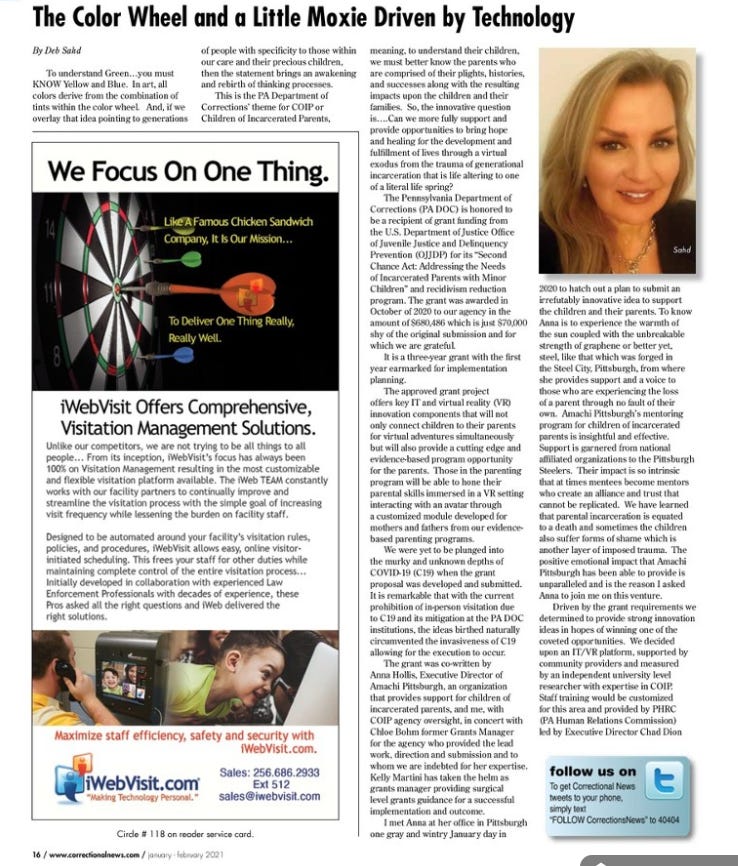Trade-offs and Triumphs 27 by @jennykim
Issue 27:The Science of Changing People’s Minds, #NegotiationTribe Q&A with Gary Noesner, Resources for the Week, Closing Thoughts
👋 Hello, friends! Thank you for subscribing! Thank you for reading!
Welcome to issue 27 of Trade-offs and Triumphs - a newsletter of resources and thoughts about how to balance trade-offs in life to find and celebrate the small triumph; every decision point requires thinking through trade-offs and not just immediately aiming for the “solution.”
How was your week? What were your trade-offs and triumphs?
✨✨✨A spotlight on the important work that our corrections officials are during COVID - focused on the needs of children of incarcerated parents, even virtually. My friend and criminal justice advocate, Deb Sahd writes in Correctional News, January/February 2021 about innovations to support children of incarcerated parents:
How do we better know the parents and their plights, histories and successes, and how all that has impacted their children and families?
How can we more fully support and provide opportunities for hope and healing of these lives through a “virtual exodus from the trauma of generational incarceration”?
Read on ✨✨✨
This week we will hit on:
The Science of Changing People’s Minds
#NegotiationTribe Q&A with Gary Noesner
Resources for the Week
Closing Thoughts
For a quick oral summary of Issue 27, hit ▶️ below:
The Science of Changing People’s Minds - Or Not
“Refuting a point of view produces antibodies against future attempts at influence, making people more certain of their own opinions and more ready to rebut alternatives.” - Adam Grant
To preserve friendships and family relationships, we often have silently decided not to discuss contentious issues, such as politics, religion, and vaccinations.
And, we often label the other person as being “unreasonable,” or “unscientific.”
But, what if, we focused less on changing the other person’s mind and instead, trying to understand that person’s perspectives? How do we restrain our initial instinct to argue against their opposite oppositions, preach why we’re right and they are wrong? How do we avoid inadvertently creating “antibodies against future attempts at influence” and ensure that the door is always open to views evolving?
Ask open-ended questions and listen carefully - hold up a mirror so that the other person can see his/her thoughts more clearly.
Don’t enter the conversation with a desire to use the questions as a way to change the other person’s mind - make sure that you do have a genuine desire to understand his/her motivations and help them reach their goals.
Listen carefully and call attention to the nuances in the other person’s thinking.
Ask the “how” questions, instead of going straight for the “why.”
Remember, don’t view this conversation as points to score and debates to win. You are listening for the nuances, and you are learning. And hopefully, the other person will start doing the same.
Don’t automatically assume that the other side is close-minded. Examine yourself against the mirror first, and then reboot.

Every conversation is an emotional conversation, and the sooner you admit that, the richer your conversations with others will be.
Even the ones with yourself.
#NegotiationTribe Q&A with Gary Noesner
Asking good questions is essential in creating and sustaining positive personal and professional relationships, especially when managing conflicts.
This Friday, on February 5, 2021, at 2pm ET (7pm UTC), Gary Noesner, author of Stalling Time and former chief of the FBI Crisis Negotiation Unit, will be the special guest of the #NegotiationTribe Q&A. If you are interested in participating in this Zoom presentation, you should:
Register at the #NegotiationTribe site
Reach out to Allan Tsang on LinkedIn and submit your questions to him.
And to learn more about the #NegotiationTribe or to learn more about how to hone your own negotiation skills, please feel free to reach out to Allan Tsang or Dan Oblinger.
You can also listen to them on the Sales Leadership Podcast with Paul Lanigan: “Why Win/Win Negotiation is a Myth.”
Remember, negotiation is more than just haggling for the price of a car, house, or any item.
Because as Kwame Christian explained in Jesse Hempel’s Hello Monday, “There’s a big difference between being right and being persuasive.”
Resources for the Week
✨On the Deck Writing Fellowship Cohort 2 - the first week officially started and ended last week. Meeting all the impressive fellows and learning how to edit were the two major highlights of the week. #ODW2 Shivani tweeted out a thread about editing and the compounding effect of layered learning:

Closing Thoughts
✨When the Muse Hits - Special Contribution from Adam Kissel
“The” crosses the boundary from indefinite to definite, from anywhere to home.
“As” connects by characteristics—sameness despite difference.
“Etc.” admits all of a feather into the same community.
“So” fully accepts what has come before.
To “dog” is to track down like a dog, but it also should mean to follow in love like a dog.
“May” lets anything happen. “Can” encourages you to succeed. “Will” is your inspiration.
✨ Be Yourself Despite the Currents

Please leave me your questions or thoughts in the Comments section below 👇👇👇
You can also:
Follow me on Twitter or DM me there, or
Email me at jennykimwop@gmail.com.
If you are enjoying Trade-offs and Triumphs, I would love it if you shared it with a friend or two by forwarding it or sharing it with the button below!
Be conscious of your trade-offs. Before settling on any one “solution,” run your fingers through all the trade-offs and decide intentionally and specifically.
And then celebrate your triumphs, no matter how small.





